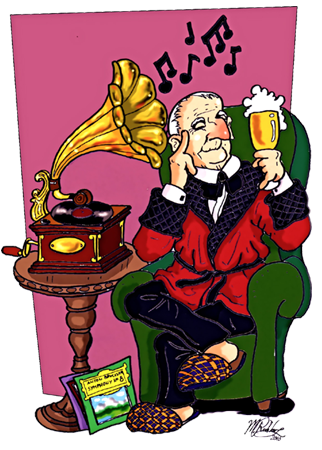|
|
Bruckner Archive acquires a 1919 Vienna Symphony Orchestra Bruckner Fest Flyer |  | | | Click to enlarge |
In 1900, Ferdinand Loewe founded the Wiener Symphoniker. He remained its chief conductor until 1925. During that time, he was a strong proponent of Bruckner's music and occasionally presented a "Bruckner Fest." In 1919, the first Bruckner Fest was held and the Bruckner Archive has acquired one of the promotional flyers.
The flyer (shown to the right) announces a chamber concert, a choral concert and two orchestral performances.
 Ferdinand Loewe and his Vienna Symphony Orchestra
Here are the specifics of each concert (Courtesy: Gilles Houle)
23 April 1919 (Wednesday at 6:00 pm) - Vienna - Konzerthaus Großer-Saal
-Ferdinand Löwe
-Wiener Symphoniker and the Wiener Singakademie mixed-choir
Anton Bruckner : Psalm 150 for soprano, mixed-choir and orchestra (WAB 38)
-Soloist : Gertrude Förstel
Anton Bruckner : Symphony No. 8 in C minor, 1892 version edited by Haslinger-Schlesinger-Lienau (WAB 108)
24 April 1919 (Thursday at 6:00 pm) - Chamber Concert at the "Mozartsaal" of the Konzerthaus
This concert organized by the Society's Concert Office ("Konzertbüro") and was repeated on Monday, April 28th.
Anton Bruckner: Three Choral Works:
Um Mitternacht (WAB 89) (1864)
Träumen und Wachen (1890)
Laßt Jubeltöne laut erklingen: Festive song (cantata) (1854)
-The Wiener Schubertbund, under the direction of Ferdinand Rebay
-Alexander Pöschl, piano.
Anton Bruckner: String Quintet in F major (1879)
-The Wiener Konzerthaus Quartet (August Jancovich, first violin; Heinrich Graeser, second violin; Karl Doktor, first viola; Paul Grümmer, violoncello) and Otto Rieger (2nd viola)
25 April 1919 (Friday at 6:00 pm) - Vienna - Konzerthaus Großer-Saal
-Ferdinand Löwe
-Wiener Symphoniker and the Wiener Singakademie mixed-choir
Anton Bruckner : Symphony No. 9 in D minor (unfinished) , Ferdinand Löwe's retouched version of 1903 (WAB 109)
Anton Bruckner : Te Deum for soloists (SATB), mixed-choir, orchestra and organ (1884) (WAB 45)
-Gertrude Förstel, soprano; Emilie Rutschka, alto
-Karl Bagar, tenor; Richard Mayr, bass
27 April 1919 (Sunday at 6:00 pm)- Vienna - Konzerthaus Großer-Saal
-Ferdinand Löwe
-Wiener Symphoniker » and the Wiener Singakademie mixed-choir
Anton Bruckner : Mass No. 3 (« The Great ») in F minor for soloists (SATB) , mixed-choir, orchestra and organ (WAB 28)
-Gertrude Förstel, soprano; Emmy Heim, alto
-Arthur Preuß, tenor; Richard Mayr, bass
THE GENESIS OF THE BRUCKNER-FEST
From the 1918-1919 season onward, the music programs of the Vienna Konzerthaus began to carry to a greater extent the personal signature of the Secretary-General (appointed for the 1912-1913 season) of the Austrian musicologist Hugo Botstiber (born on April 21, 1875 in Vienna).
 Hugo Botstiber (ca. 1920)
The majority of the concerts officially organized by the Konzerthaus Society still relied on the symphonic cycles given by the Wiener Konzert-Verein (Vienna Concert Society) under the direction of Ferdinand Löwe. For economic reasons, the orchestra continued its close collaboration with the Tonkünstler Orchestra Association (which inevitably lead, after the First World War, to a merger and the creation in 1919 of the Wiener Symphoniker).
However, these programs only accounted for about thirty percent of the total concert activity of the Konzerthaus Society. The Society's Concert Office (Konzertbüro) was responsible for the remaining seventy percent of the programming. Botstiber increasingly pushed forward his own visionary projects. He was also involved in their design. It was Botstiber who encouraged the creation of a Bruckner Festival. Its first edition took place from April 23 to April 27, 1919 (see flyer above). It included three symphonic concerts (with the participation of the Vienna Symphony Orchestra and the Vienna Singakademie under the direction of Löwe) and one chamber music concert (with the participation of the Vienna Schubertbund male-choir and the Wiener Konzerthaus String Quartet).
Hugo Botstiber came from a Jewish family, but converted to the Roman Catholicism in 1897. He studied at the Vienna Conservatory under Robert Fuchs and Guido Adler and took private lessons with Alexander von Zemlinsky. In 1900, he was hired as music librarian at the Gesellschaft der Musikfreunde. In 1905, he was appointed as its secretary and director. After his retirement, Botstiber continued working as a private scholar. With the annexation of Austria into Nazi Germany ("Anschluß") in 1938, he emigrated to the United Kingdom. He died on January 15, 1941 in Shrewsbury in Shropshire, England.
(Source: Robert Lackner. "Hugo Botstiber und das Wiener Konzerthaus: Leben und Wirken eines Kulturmanagers vom “ Fin de Siècle ” bis zum Anschluß") (translation: Gilles Houle)
|
|
|
 ABruckner.com
ABruckner.com